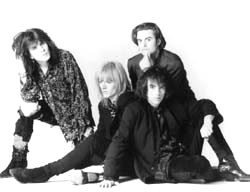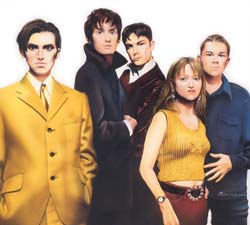New Wave lingers on, like the waves in the sea (10th Anniversary of this article!)
{especially dedicated to people who know New Wave music}
 [Photo grabbed from back_to_the_edge yahoogroups to which I belong]
[Photo grabbed from back_to_the_edge yahoogroups to which I belong]
Taking a break from my homestudy review (I am to take Examination Three in a little while), I went Net surfing, googled my name once again—aLfie vera mella—and among the various hits that appeared on my monitor is a particular site which features an article I wrote—an article about New Wave which I could no longer recall ever writing it. All I could remember is that I wrote this particular article a few years ago on a Net forum or something.
Reading the article, I found the arguments about New Wave music that I presented very substantial, especially to people who love New Wave music. Although, I'm no longer sure if I still keep the same, exact sentiment. Regardless, most of what I said is still a part of my belief system.
One more note, when I use the musical term "New Wave," I'm referring to the classification of music which encompasses New Wave, BritPop, Indie, Gothic, Guitar Pop, etc., as how these subgenres have been known in the Philippines. For, after a thorough research about Rock music in the recent years, I came to realize that New Wave is just a small subcategory of the broad and diverse genre of Alternative Rock. Despite this new discovery, I still want to share the article below because I feel that what mattered most was my conviction when I wrote it.
More so, now, I no longer use the term "New Wave" when lumping my most favorite types of music under one appellation. I feel now that the term "Alternative Rock" is more appropriate and encompassing, add to that, more academically correct.
==
Did New Wave Music Leave and Die?
by aLfie vera mella
 Don't hate yourself for being sentimental and nostalgic, for we all are, especially those who are nearing the so-called midlife.
Don't hate yourself for being sentimental and nostalgic, for we all are, especially those who are nearing the so-called midlife.
I would want to believe that New Wave, actually, has never left the annals of musical history at all. Many of the people like us (including artists), who enjoyed New Wave music in the '80s, are in fact the ones who left New Wave for so many years and for many periods in the past.
Again, this will depend on how one conceptualizes New Wave as a musical art form.
My musical compatriots, allow me to express my personal concept regarding New Wave not as an era but as a distinct musical art form.
In the past, I had considered New Wave only as an era—meaning, when the '80s ended; when DWXB 102.7 was sequestered; when Power BM 105.1 changed format; when NU 107 became a melting pot of Classic and Modern Rock; when many "New Wavers" stopped teasing their hair and donning their long sleeves or kilts or trench coats; when Guns n' Roses and Metallica arrived; when Bon Jovi, Black Sabbath, and even Aerosmith were revived; and worse, when many people who used to adore the androgynous fashion of Gene Loves Jezebel, Duran Duran, Depeche Mode, and many others began to laugh at and even loathe such "pretentious" and self-indulging fashion—I, too, thought, New Wave is dead and gone.
 Well, as I said, if we are to consider New Wave as only a passing trend and an era, of course, safe it is to say that New Wave is indeed dead and gone—for the '80s—the birth-period of New Wave—is already history. But upon deep musical introspection and retrospection, I came to realize that New Wave, after all these years, has evolved into a legitimate musical artform—an artform as succinct and as sonically recognizable as Jazz, Classical, and Rock.
Well, as I said, if we are to consider New Wave as only a passing trend and an era, of course, safe it is to say that New Wave is indeed dead and gone—for the '80s—the birth-period of New Wave—is already history. But upon deep musical introspection and retrospection, I came to realize that New Wave, after all these years, has evolved into a legitimate musical artform—an artform as succinct and as sonically recognizable as Jazz, Classical, and Rock.
Doubtless, many would shy away from categorization and the so-called music labeling, but that's the way it is. It's a natural law of things, of order—for us to develop a discerning musical taste.
We can simply compare it to food. Of course, we can always group food into good food and bad food—like good music and bad music—but musical categorization has its purpose—it unites people who share a commonality, it allows us to find easily songs that we like, and most especially, it provides us a sense of ownership, belongingness, and community.
 Don't you delight in saying I am a New Waver, I am a Punk Rocker, or even I prefer Jazz music, I love "Boyband" music?
Don't you delight in saying I am a New Waver, I am a Punk Rocker, or even I prefer Jazz music, I love "Boyband" music?
So now that New Wave, being a legitimate musical art form, has been put into light—did it actually leave us during specific moments in the past? Where was New Wave during the Metal revival of the late '80s? Where was New Wave during the Grunge era of the '90s? Where is New Wave today, when most radio stations play only the old New Wave stuff, making people believe that New Wave music is '80s music? Such preposterousness!
 New Wave is always there—silent, but it never left us at all. New Wave has always been there for people who will find time—with the aid of his/her discerning ears—to look for it.
New Wave is always there—silent, but it never left us at all. New Wave has always been there for people who will find time—with the aid of his/her discerning ears—to look for it.
Where was New Wave during the Heavy Metal revival of the late '80s? It was there, although out of the limelight...but it was there...pleading to its forgetful followers...
Realize that the following artists/songs were there alongside Metallica, Guns n' Roses, and other Metal artists and songs. We simply ignored them for quite a while: The Cure's Wish, Wild Mood Swings, and Galore. Remember "Friday, I'm in Love," "High," "A Letter to Elise," "Mint Car," "13th," and "Strange Attraction"? They were sometimes on MTV or the radio but we simply ignored them in favor of "Sweet Child o' Mine," "Bed of Roses," and "Enter Sandman."
Toad the Wet Sprocket. Wasn't "All I Want" popular during the advent of the '90s? So were "Regret" (New Order), "Through the Barricades" (Spandau Ballet), "Ordinary World" and "Come Undone" (Duran Duran), and even "Advice for the Young at Heart" (Tears for Fears)?
 Where was New Wave during the Grunge era of the '90s? Couldn't we classify The Cranberries, Electronic, Love Spit Love, and Monaco New Wave? Weren't these artists there during those times?
Where was New Wave during the Grunge era of the '90s? Couldn't we classify The Cranberries, Electronic, Love Spit Love, and Monaco New Wave? Weren't these artists there during those times?
What about the so-called BritPop artists? Isn't BritPop just a new term coined by media people for commercial purposes? Just to have a fresh music genre for the new and younger generation of music lovers?
Because for me, I have always regarded these '90s artists as New Wave, especially that I kind of developed a "feel"—it's hard to explain but, usually, I can say when a particular song can be classified as New Wave: The Lemonheads, Gin Blossoms, Radiohead, Blur, Pulp, Popsicle, Dillon Fence, Paul Westerberg, The Smashing Pumpkins, Rialto, The Essence, The Cardigans, Lush, Breeders, Belly. Even The Lighthouse Family.
 Where is New Wave today? Aren't pioneering artists such as Robert Smith and the rest of The Cure still active? So as New Order, Depeche Mode, a-ha, Duran Duran, Ian McCulloch and the remaining Bunnymen? Hasn't Morrissey just stepped into the limelight again with a new album? Have you heard of The Killers, Bravery, Communique, Kaiser Chiefs, Nightmare of You, Columbus, Voxtrot...
Where is New Wave today? Aren't pioneering artists such as Robert Smith and the rest of The Cure still active? So as New Order, Depeche Mode, a-ha, Duran Duran, Ian McCulloch and the remaining Bunnymen? Hasn't Morrissey just stepped into the limelight again with a new album? Have you heard of The Killers, Bravery, Communique, Kaiser Chiefs, Nightmare of You, Columbus, Voxtrot...
Actually, there are lots of contemporary artists whose "sound of music"—whether they accept it or not—can be regarded as New Wave. And ultimately, everything really depends on people like us—who claim that New Wave is indeed alive, recognized, and loved!
For whatever others might have to say—a musical art form is only as good as its followers. If we continue to ignore the existence of this musical artform that gifted us with many friends and made us creative and musically principled individuals, then New Wave is as good as dead. But if we keep on embracing and spreading the legacy of New Wave music, then and only then can New Wave be recognized as a timeless kind of intelligent music.
Just like,
Beethoven, Bach, and Mozart may have long been dead and gone, but Classical music lingers on.
 [Photo grabbed from back_to_the_edge yahoogroups to which I belong]
[Photo grabbed from back_to_the_edge yahoogroups to which I belong]Taking a break from my homestudy review (I am to take Examination Three in a little while), I went Net surfing, googled my name once again—aLfie vera mella—and among the various hits that appeared on my monitor is a particular site which features an article I wrote—an article about New Wave which I could no longer recall ever writing it. All I could remember is that I wrote this particular article a few years ago on a Net forum or something.
Reading the article, I found the arguments about New Wave music that I presented very substantial, especially to people who love New Wave music. Although, I'm no longer sure if I still keep the same, exact sentiment. Regardless, most of what I said is still a part of my belief system.
One more note, when I use the musical term "New Wave," I'm referring to the classification of music which encompasses New Wave, BritPop, Indie, Gothic, Guitar Pop, etc., as how these subgenres have been known in the Philippines. For, after a thorough research about Rock music in the recent years, I came to realize that New Wave is just a small subcategory of the broad and diverse genre of Alternative Rock. Despite this new discovery, I still want to share the article below because I feel that what mattered most was my conviction when I wrote it.
More so, now, I no longer use the term "New Wave" when lumping my most favorite types of music under one appellation. I feel now that the term "Alternative Rock" is more appropriate and encompassing, add to that, more academically correct.
==
Did New Wave Music Leave and Die?
by aLfie vera mella
 Don't hate yourself for being sentimental and nostalgic, for we all are, especially those who are nearing the so-called midlife.
Don't hate yourself for being sentimental and nostalgic, for we all are, especially those who are nearing the so-called midlife.I would want to believe that New Wave, actually, has never left the annals of musical history at all. Many of the people like us (including artists), who enjoyed New Wave music in the '80s, are in fact the ones who left New Wave for so many years and for many periods in the past.
Again, this will depend on how one conceptualizes New Wave as a musical art form.
My musical compatriots, allow me to express my personal concept regarding New Wave not as an era but as a distinct musical art form.
In the past, I had considered New Wave only as an era—meaning, when the '80s ended; when DWXB 102.7 was sequestered; when Power BM 105.1 changed format; when NU 107 became a melting pot of Classic and Modern Rock; when many "New Wavers" stopped teasing their hair and donning their long sleeves or kilts or trench coats; when Guns n' Roses and Metallica arrived; when Bon Jovi, Black Sabbath, and even Aerosmith were revived; and worse, when many people who used to adore the androgynous fashion of Gene Loves Jezebel, Duran Duran, Depeche Mode, and many others began to laugh at and even loathe such "pretentious" and self-indulging fashion—I, too, thought, New Wave is dead and gone.
 Well, as I said, if we are to consider New Wave as only a passing trend and an era, of course, safe it is to say that New Wave is indeed dead and gone—for the '80s—the birth-period of New Wave—is already history. But upon deep musical introspection and retrospection, I came to realize that New Wave, after all these years, has evolved into a legitimate musical artform—an artform as succinct and as sonically recognizable as Jazz, Classical, and Rock.
Well, as I said, if we are to consider New Wave as only a passing trend and an era, of course, safe it is to say that New Wave is indeed dead and gone—for the '80s—the birth-period of New Wave—is already history. But upon deep musical introspection and retrospection, I came to realize that New Wave, after all these years, has evolved into a legitimate musical artform—an artform as succinct and as sonically recognizable as Jazz, Classical, and Rock.Doubtless, many would shy away from categorization and the so-called music labeling, but that's the way it is. It's a natural law of things, of order—for us to develop a discerning musical taste.
We can simply compare it to food. Of course, we can always group food into good food and bad food—like good music and bad music—but musical categorization has its purpose—it unites people who share a commonality, it allows us to find easily songs that we like, and most especially, it provides us a sense of ownership, belongingness, and community.
 Don't you delight in saying I am a New Waver, I am a Punk Rocker, or even I prefer Jazz music, I love "Boyband" music?
Don't you delight in saying I am a New Waver, I am a Punk Rocker, or even I prefer Jazz music, I love "Boyband" music?So now that New Wave, being a legitimate musical art form, has been put into light—did it actually leave us during specific moments in the past? Where was New Wave during the Metal revival of the late '80s? Where was New Wave during the Grunge era of the '90s? Where is New Wave today, when most radio stations play only the old New Wave stuff, making people believe that New Wave music is '80s music? Such preposterousness!
 New Wave is always there—silent, but it never left us at all. New Wave has always been there for people who will find time—with the aid of his/her discerning ears—to look for it.
New Wave is always there—silent, but it never left us at all. New Wave has always been there for people who will find time—with the aid of his/her discerning ears—to look for it.Where was New Wave during the Heavy Metal revival of the late '80s? It was there, although out of the limelight...but it was there...pleading to its forgetful followers...
Realize that the following artists/songs were there alongside Metallica, Guns n' Roses, and other Metal artists and songs. We simply ignored them for quite a while: The Cure's Wish, Wild Mood Swings, and Galore. Remember "Friday, I'm in Love," "High," "A Letter to Elise," "Mint Car," "13th," and "Strange Attraction"? They were sometimes on MTV or the radio but we simply ignored them in favor of "Sweet Child o' Mine," "Bed of Roses," and "Enter Sandman."
Toad the Wet Sprocket. Wasn't "All I Want" popular during the advent of the '90s? So were "Regret" (New Order), "Through the Barricades" (Spandau Ballet), "Ordinary World" and "Come Undone" (Duran Duran), and even "Advice for the Young at Heart" (Tears for Fears)?
 Where was New Wave during the Grunge era of the '90s? Couldn't we classify The Cranberries, Electronic, Love Spit Love, and Monaco New Wave? Weren't these artists there during those times?
Where was New Wave during the Grunge era of the '90s? Couldn't we classify The Cranberries, Electronic, Love Spit Love, and Monaco New Wave? Weren't these artists there during those times?What about the so-called BritPop artists? Isn't BritPop just a new term coined by media people for commercial purposes? Just to have a fresh music genre for the new and younger generation of music lovers?
Because for me, I have always regarded these '90s artists as New Wave, especially that I kind of developed a "feel"—it's hard to explain but, usually, I can say when a particular song can be classified as New Wave: The Lemonheads, Gin Blossoms, Radiohead, Blur, Pulp, Popsicle, Dillon Fence, Paul Westerberg, The Smashing Pumpkins, Rialto, The Essence, The Cardigans, Lush, Breeders, Belly. Even The Lighthouse Family.
 Where is New Wave today? Aren't pioneering artists such as Robert Smith and the rest of The Cure still active? So as New Order, Depeche Mode, a-ha, Duran Duran, Ian McCulloch and the remaining Bunnymen? Hasn't Morrissey just stepped into the limelight again with a new album? Have you heard of The Killers, Bravery, Communique, Kaiser Chiefs, Nightmare of You, Columbus, Voxtrot...
Where is New Wave today? Aren't pioneering artists such as Robert Smith and the rest of The Cure still active? So as New Order, Depeche Mode, a-ha, Duran Duran, Ian McCulloch and the remaining Bunnymen? Hasn't Morrissey just stepped into the limelight again with a new album? Have you heard of The Killers, Bravery, Communique, Kaiser Chiefs, Nightmare of You, Columbus, Voxtrot...Actually, there are lots of contemporary artists whose "sound of music"—whether they accept it or not—can be regarded as New Wave. And ultimately, everything really depends on people like us—who claim that New Wave is indeed alive, recognized, and loved!
For whatever others might have to say—a musical art form is only as good as its followers. If we continue to ignore the existence of this musical artform that gifted us with many friends and made us creative and musically principled individuals, then New Wave is as good as dead. But if we keep on embracing and spreading the legacy of New Wave music, then and only then can New Wave be recognized as a timeless kind of intelligent music.
Just like,
Beethoven, Bach, and Mozart may have long been dead and gone, but Classical music lingers on.

